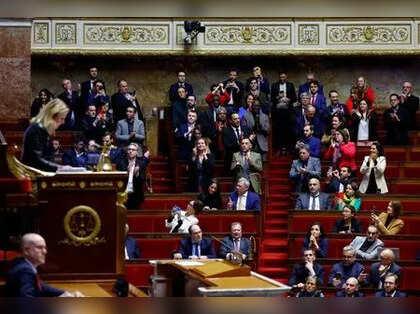Introduction:
As France grapples with mounting political tensions and widespread public discontent, the nation finds itself once again teetering on the brink of crisis. Amidst a backdrop of economic challenges, social unrest, and a fracturing political landscape, citizens are confronting a series of far-reaching issues that threaten to reshape the countryŌĆÖs future. In this article, we explore the current state of French politics, examining the factors driving this turbulence, the responses from government officials and political parties, and the implications for Europe as a whole. With protests erupting in major cities and parliamentary debates becoming increasingly contentious, the question looms: How will France navigate this turbulent chapter in its storied political history?
Political Polarization and the Rise of Extremism in France
In recent years, France has witnessed a significant rise in political polarization, a phenomenon aggravated by economic instability and social unrest. The divide between left and right has deepened, characterized by an increasing number of voters aligning with extremist ideologies. This shift not only reflects discontent with traditional political structures but also reveals a growing sections of the populace who feel alienated from mainstream discourse. The rising influence of parties such as the National Rally has further polarized the electoral landscape, drawing in supporters through nativist rhetoric and calls for radical change.
The political climate is increasingly charged, with key issues such as immigration, national identity, and economic inequality driving wedges between differing political factions. Public demonstrations have become more frequent, often marked by confrontations between opposing political groups. Recent polling indicates that a significant portion of the electorate is open to extremist views, posing a challenge not only to stability but also to France’s democratic ideals. To understand the implications of this polarization, one must consider the impact on governance and societal cohesion:
| Factors Contributing to Polarization | Impact on Society |
|---|---|
| Economic Crisis | Increased discontent and frustration. |
| Immigration Debate | Heightened tensions and xenophobia. |
| Social Media Influence | Spread of misinformation and radical ideas. |
| Political Disillusionment | Alienation from traditional parties. |
Economic Challenges Intensify Public Discontent
The current economic climate in France is marked by rising inflation and increasing unemployment rates, exacerbating frustrations among the populace. Many citizens are feeling the squeeze as the cost of living continues to climb, leading to significant cuts in disposable income. In response, protests and strikes have erupted across the nation, as various labor unions and social groups demand government action. The dissatisfaction stems from a perception that policymakers are out of touch with the everyday struggles faced by ordinary citizens. The government’s inability to effectively tackle these pressing issues has fueled a growing discontent that threatens the political stability of the nation.
Recent surveys indicate that over 70% of the population believes the government has mishandled economic recovery efforts. Key grievances include:
- Rising energy prices: Many families are struggling to afford basic utilities.
- Job insecurity: As companies grapple with rising costs, layoffs have become more common.
- Food inflation: Basic groceries are becoming increasingly unaffordable, especially for lower-income households.
To illustrate the gravity of the situation, the following table summarizes the latest economic indicators affecting public sentiment:
| Indicator | Current Rate | Change Since Last Year |
|---|---|---|
| Inflation | 6.5% | +2.1% |
| Unemployment | 8.2% | +0.5% |
| Consumer Confidence | 45/100 | -15 |
The Role of Youth Movements in Shaping France’s Future
Youth movements in France are increasingly recognized as pivotal forces in the nationŌĆÖs political landscape, especially in times of upheaval. These groups have mobilized around pressing issues, such as climate change, social justice, and educational reforms, compelling traditional political parties to respond with urgency. Their influence is often demonstrated through organized protests, viral social media campaigns, and strategic alliances, which have reshaped the discourse around the future of the nation. As they amplify their voices, the challenges they advocate for resonate deeply with a broad spectrum of the electorate, highlighting the generational divides that characterize contemporary French society.
The emergence of these movements has also led to a re-evaluation of political priorities, with established leaders forced to reconsider their platforms. Key factors driving this evolution include:
- Innovative Communication: Utilizing social media to engage young voters directly.
- Intersectionality: Bridging various social issues to create a unified front.
- Grassroots Mobilization: Fostering local activism to summon widespread support.
This dynamic has resulted in a transformative potential for France’s political framework, with youth movements poised not only to influence policy but to redefine the very essence of civic engagement in the 21st century.
| Key Youth Movements | Main Focus Areas |
|---|---|
| Extinction Rebellion | Climate Justice |
| Les Youths | Social Equality |
| Research, Youth, Action (RYA) | Education Reform |
Strategies for Political Stability and Reform in a Divided Nation
Amid the rising tensions and societal fractures, implementing effective strategies for political stability is crucial. First, fostering an environment for inclusive dialogue among various political factions can aid in bridging gaps. Establishing community forums allows citizens to voice their concerns and have them addressed by policymakers, creating a more engaged electorate. Additionally, transparent governance practices can help rebuild trust in the political system, reducing polarization.
Moreover, initiating economic reforms that prioritize social equity is vital to ensure broader support. Policies that focus on job creation and improved social services can alleviate some of the frustrations that fuel division. Developing a consistent communication strategy that highlights both triumphs and challenges can also keep the public informed and engaged. Table 1 summarizes key reforms that could be considered for enhancing political stability:
| Reform Initiative | Objective | Expected Outcome |
|---|---|---|
| Community Dialogue Programs | Bridge political divides | Increased civic participation |
| Economic Equity Measures | Reduce social inequality | Enhanced social stability |
| Transparency in Governance | Rebuild public trust | Lower political tensions |
Wrapping Up
As France once again finds itself on the precipice of political upheaval, the ramifications of its current crisis extend far beyond its borders. The government’s struggle to maintain stability amid rising discontent highlights deep-seated issues within its socio-political fabric. With demonstrations erupting and calls for reform intensifying, the future of French governance hangs in the balance. Observers worldwide will be watching closely as the nation grapples with its identity and direction in an increasingly fragmented political landscape. Whether this moment will serve as a catalyst for meaningful change or plunge the country deeper into chaos remains to be seen. Ultimately, the eyes of EuropeŌĆöand, indeed, the worldŌĆöremain firmly fixed on France.




